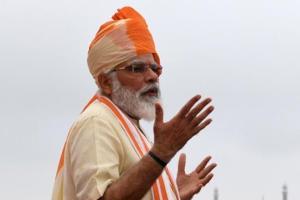Prime Minister Narendra Modi announced that a project to connect Indias over six lakh villages with an optical fibre network will be completed in the next 1,000 days

Narendra Modi
The Indian government's plan to connect over six lakh villages with optical fibre network is the kind of "generational projects" required to build the country better in a post-COVID world as it focuses on the inclusion and leapfrogging access to information and services, a top UN official has said.
ADVERTISEMENT
On India's 74th Independence Day, Prime Minister Narendra Modi announced that a project to connect India's over six lakh villages with an optical fibre network will be completed in the next 1,000 days.
"I welcome the Prime Minister's announcement on fibre optic cable connectivity. It is precisely, in this crisis, that we need generational projects of that magnitude to not only be conceived but to actually be implemented and financed because they are the investment in the 'Build Forward Better' in the recovery strategy (post-COVID)," United Nations Development Programme (UNDP) Administrator Achim Steiner told PTI in an interview on Wednesday.
"They are by their very nature focussed on inclusion on the poor because it is by connecting the villages that we enable people to leapfrog a generational access to information and services," he said.
Steiner said India has an extraordinarily dynamic and globally relevant digital finance industry, combined with a public policy and government role also.
"We consider India as one of the frontier countries in software development, in linking the possibilities of technology -- hardware and software -- to development outcomes.
"Some of the work we're doing with Indian private sector as well as the public sector institutions, including the NITI Aayog, in understanding how that horizon can be expanded very quickly is something that we truly appreciate," he said.
Steiner said as head of UNDP and together with UN Secretary-General Antonio Guterres, he is constantly appealing to countries to seize this moment of crisis, economic free-fall and trauma that COVID has caused "as a generational moment also. This kind of investment is pointing the way to the future".
Steiner co-chairs a task force on Digital Financing of the Sustainable Development Goals (SDGs) established by Guterres. The task force's report, 'People's Money: Harnessing Digitalization to Finance a Sustainable Future', was released on Wednesday.
On lessons that other nations can take from the digital revolution in India, Steiner said he has repeatedly expressed UNDP's strong interest in working with India in quickly exploring the possibilities of how technology and development priorities captured in the SDGs and national policies can actually drive investment and how public regulatory policy needs to evolve very quickly.
"Agility is a key dimension here but I have expressed repeatedly my strong interest in working with India as a partner in South-South cooperation also because while there is no one size fits all, India's own laboratory is a laboratory also for the world to explore both technology and programmatic initiatives," he said.
He said with UNDP working in 170 countries on the frontlines of data development and innovation, it enables the UN body to connect the spectrum of possibility within tailor made national programmes in which the UN might work with India in one area and the European Union in another.
"That is the power of multilateralism within the development sphere that we can shorten that timeline between where new possibilities emerge and national governments can quickly adapt them to their national context and invest in them," he said.
On the task force report, Steiner said digital finance's dramatic potential for transformative impact is being revealed by the pandemic. Digital transfers enable governments to get support to people in need, crowdfunding platforms have mobilised funds for medical supplies and emergency relief, and algorithmic lending means small businesses have quicker access to funds.
"For digitalisation to be a true force for delivering on the SDGs, technological advances must combine with sound policy that empowers citizens and enables our financial system to meet the urgent investment challenges that must be overcome to build forward better," he said.
Launching the report, Guterres said in the midst of COVID-19 turmoil, digital technology is a critical lifeline, enabling billions of people to maintain connections with loved ones, buy daily necessities, preserve their livelihoods and receive government aid.
He said digitalisation will make a difference by giving people greater control over how global finance " their own money " is used.
The report notes that digital financing has broadened access to financial services for millions of low-income customers and MSMEs around the world. It cites the example of fintech start-ups in India such as LenddoEFL and CreditVidya that offer collateral-free, credit lines, augmented with social media, psychometric, big data, and geo-location information.
Citing Indian government's data on Direct Benefit Transfer, the report said, 'Digitalisation has saved India's government an estimated USD 22 billion to date.'
The report said almost half of the world's population, about 3.2 billion people, already have some form of ID able to be used online. "This is expected to rise to 5 billion by 2024," it said, taking note of the Aadhaar card issued by the Indian government.
Keep scrolling to read more news
Catch up on all the latest Crime, National, International and Hatke news here. Also download the new mid-day Android and iOS apps to get latest updates.
Mid-Day is now on Telegram. Click here to join our channel (@middayinfomedialtd) and stay updated with the latest news
This story has been sourced from a third party syndicated feed, agencies. Mid-day accepts no responsibility or liability for its dependability, trustworthiness, reliability and data of the text. Mid-day management/mid-day.com reserves the sole right to alter, delete or remove (without notice) the content in its absolute discretion for any reason whatsoever
 Subscribe today by clicking the link and stay updated with the latest news!" Click here!
Subscribe today by clicking the link and stay updated with the latest news!" Click here!







